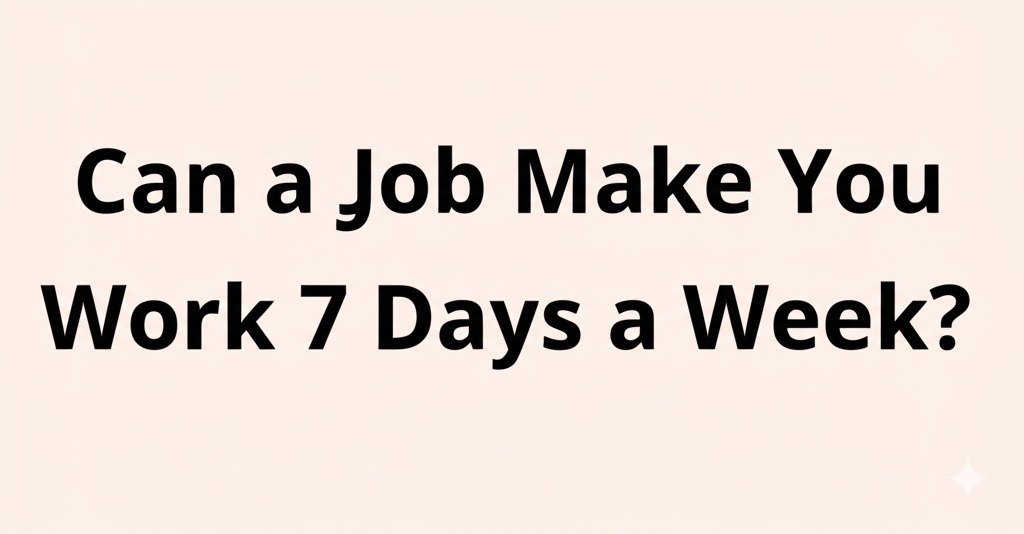
Imagine working every single day without a break—sounds exhausting, right? While it may seem extreme, some employers do require employees to work seven days a week, either regularly or during peak periods. But is it legal? Is it ethical? And more importantly, is it sustainable?
In this article, we’ll explore whether a job can legally and practically demand a seven-day workweek, what labor laws say about it, and how you can protect your rights as an employee.
Understanding the 7-Day Workweek
What Does Working 7 Days a Week Mean?
Working 7 days a week means not having any days off, often for extended periods. This could happen due to:
- High-demand industries (e.g., healthcare, food service, retail)
- Seasonal surges or understaffing
- Company culture that promotes overworking
While some individuals may voluntarily choose this schedule, for others, it may be imposed by an employer, leading to burnout, stress, and legal concerns.
Is It Legal to Work 7 Days a Week?
U.S. Federal Labor Laws
Under federal labor law, there is no limit on the number of days an adult employee can work in a row. The Fair Labor Standards Act (FLSA) does not require employers to give days off unless otherwise stated in state law or union contracts.
That means, yes, a job can make you work 7 days a week, as long as:
- You’re being paid at least minimum wage
- You receive overtime pay for hours over 40 per week (1.5x your regular rate)
State Labor Laws May Offer More Protection
Some states do have laws that regulate consecutive workdays. For example:
- California: Employers must provide at least one day off in seven, though there are exceptions.
- Illinois: Workers are entitled to at least 24 hours of rest every calendar week.
- New York: Certain industries (like factories) are required to give a day of rest each week.
Always check your local labor laws for specific protections.
Exceptions and Loopholes
Voluntary vs. Mandatory
Sometimes employees volunteer to work 7 days for extra income. If it’s not forced and you’re fairly compensated, it’s typically legal.
However, if you’re being pressured or punished for refusing, that could violate labor standards or lead to a toxic work environment.
Exempt Employees
If you’re classified as an exempt employee (usually salaried workers in executive or professional roles), you may not be eligible for overtime—even if you’re working 60–70 hours a week.
Be cautious of misclassification, which is a common labor law violation.
The Impact on Health and Productivity
Physical and Mental Strain
Working 7 days a week takes a toll on both physical and mental health. Common consequences include:
- Burnout and fatigue
- Increased risk of depression and anxiety
- Higher chance of workplace accidents
- Reduced creativity and productivity
Work-Life Balance
Without days off, maintaining relationships, hobbies, and personal care becomes nearly impossible. Over time, this imbalance can lead to long-term dissatisfaction and even health issues.
What You Can Do if You’re Asked to Work Every Day
Know Your Rights
First, educate yourself about:
- Federal and state labor laws
- Your employment contract or union agreement
- Your company’s HR policies
Talk to Your Employer
Sometimes, employers may not realize the strain they’re causing. Start a conversation about workload, breaks, and scheduling. Propose alternatives like staggered shifts or rotating days off.
File a Complaint if Necessary
If your rights are being violated, you can:
- Contact your state labor department
- File a complaint with the U.S. Department of Labor
- Seek legal advice from an employment attorney
When Working 7 Days Makes Sense (And When It Doesn’t)
Situations Where It Might Be Justified
- Short-term deadlines or launch periods
- High earnings potential (e.g., overtime, commission)
- When it’s employee-initiated
When to Say No
- If it’s harming your health or well-being
- If it’s legally questionable
- If it’s causing a work-life crisis
Conclusion: Know Your Limits—and Your Rights
While it’s technically legal in many places for a job to require 7-day workweeks, that doesn’t mean it’s fair—or sustainable. Employers should respect the importance of rest, and employees should feel empowered to protect their time and health.
If you’re stuck in a non-stop work cycle, take a moment to reflect on whether it’s worth the cost. You deserve time to recharge.

Andre Cuevas provides career insights, job search strategies, and professional advice to help individuals navigate the job market and achieve their career goals.






